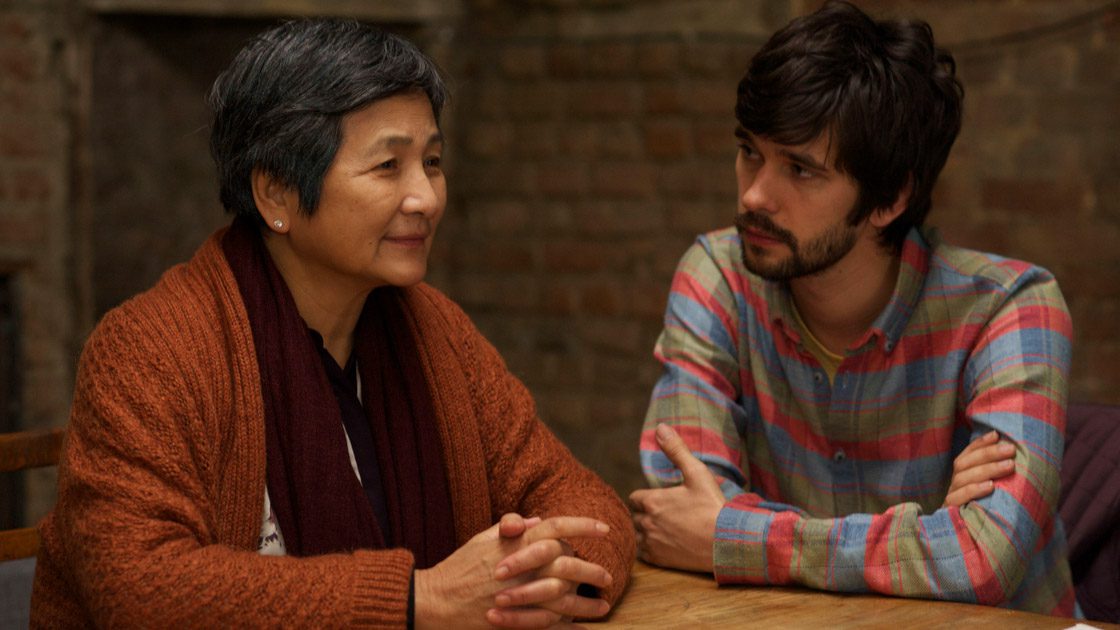“Lilting” is a term used to describe the rising and falling of the voice, mostly in regards to the Irish accent. Merriam-Webster describes it as “attractive,” “pleasing,” and “buoyant.” Lilting, the debut feature from Cambodian writer-director Hong Khaoh, similarly explores the patterns of language and communication. It is, however, a quiet meditation on the rather heavy burdens of love, loss and isolation.
The film explores the relationship between an elderly Chinese-Cambodian immigrant, Junn (Pei-Pei Cheng) and her late son’s former lover, Richard (Ben Whishaw, Skyfall). As the two both struggle to overcome the grief of their loss, Richard hires a young interpreter, Vann (Naomi Christie) to ease his own communication with Junn and help her find a connection in an elderly resident of her retirement home, Alan (Peter Bowles).
There is a quiet vulnerability to Whishaw’s lead as he struggles with becoming overbearing in his attempted care for Junn. Cheng’s stubbornness as Whishaw’s culturally-opposite comes close to flat on occasion, but in her most tender moments, she shines. This central relationship is dynamic and affecting, but the actors’ best moments are in their singularly alone moments onscreen. Cheng’s most heartbreaking moment comes in the final seconds of the film’s first sequence, a masterful flashback that grasps the most painful moments of loss in a simple cut. Whishaw shines in a similar moment toward the end of the film, and there are many likewise artful sequences that see Khoah skillfully blurring reality and memory.
Much like Pontikos’ soft cinematography, the film is a tender, cozy piece- a fireside conversation about language, loss and love.
However, when the film is fully grounded in the reality, it is far less poetic. The film never drags at a swift 86 minutes, but it begins to feel repetitive and stuck in its own circle. While gorgeous in its muted tones, Urzsula Ponitkos’ cinematography is limited to the most basic of conversational coverage. In more steady, heated conversations, this is just enough- but this lack of variation often accentuates the merely passable dialogue. This culminates in an underplayed climax that, though touching in its final moments, lacks the dramatic power to really reach audiences on another level. The film also has difficulty including the supporting players, Alan and Vann. Junn’s relationship with Alan is amusing but unfocused. As the interpreter, Vann is given an interesting humanity, but her relationship with Richard feels weak and contrived.
Lilting is not a film that attempts to be elaborate or melodramatic. Much like Pontikos’ soft cinematography, the film is a tender, cozy piece- a fireside conversation about language, loss and love. What Hong Khaoh has directed is less of a film than it is a microphone. Lilting is a film that you listen to, a piece that explores not only the barriers of language but the barriers of emotion that can keep us alone. Rather than a dynamic narrative lilt, the film unfortunately only walks a steadily level path.
Jasper Bernbaum
Jasper is a contributing writer for Cinemacy. He combines his love of music with his visual eye into a passion for live photography. He holds a BFA in Film Production from Chapman University and is an avid filmmaker, watcher, and all around cultural adventurer.

